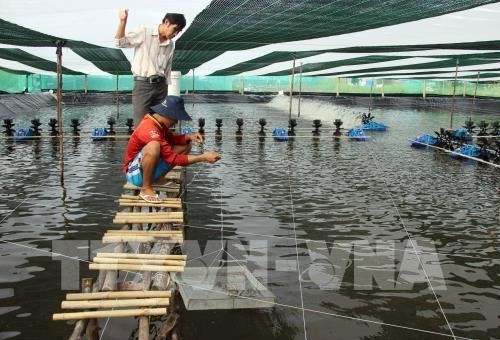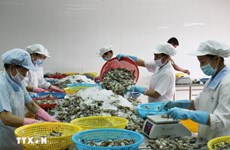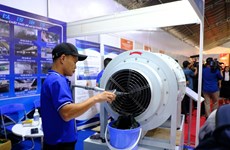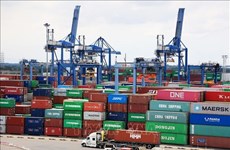Ca Mau dense shrimp farming area expanded
The area of super-intensive shrimp farming in Ca Mau province, the country’s largest shrimp producer, has increased this year as the model offers high profits for farmers.
 The area of super-intensive shrimp farming in Ca Mau province has increased this year. (Source: VNA)
The area of super-intensive shrimp farming in Ca Mau province has increased this year. (Source: VNA)HCM City (VNA) - The area of super-intensive shrimp farming in Ca Mau province, the country’s largest shrimp producer, has increased this year as the model offers high profits for farmers.
The southernmost province has about 857 ha of shrimp under the super-intensive farming model, up 175 ha from the end of last year, according to the province’s Department of Agriculture and Rural Development.
The model is called super-intensive farming because the density of shrimp is more than 150 shrimp per sq.m, three times higher than traditional farming.
The average output under the super-intensive farming model is 40-50 tonnes per ha of breeding crop. Some households have a yield of 80-100 tonnes per ha of breeding crop.
Nguyen Van Tuan, who breeds 2,000 sq.m of shrimp under the super-intensive farming model in Phu Tan district’s Phu Thuan commune, said his family harvested about 9 tonnes of shrimp per 1,000 sq.m in the last shrimp crop after three months of breeding.
With a selling price of 160,000 VND (7 USD) a kilo, his family earned a profit of hundreds of millions of VND, he said.
If farmers implement the farming techniques properly, the super-intensive farming model offers high profits, he said.
“However, this model required high investment cost,” he said, adding that his family had to invest about 700 million VND (30,800 USD) for the farming area.
Under the model, shrimp ponds are covered with net houses and plastic sheets in pond beds. The ponds are installed with fans at the pond surface and airlift pumps in the pond beds to provide oxygen for the shrimp.
Phu Tan, which has one of largest areas of super-intensive shrimp farming in the province, has 117 households with about 200 ha of shrimp under the super-intensive farming.
Mai Huu Chinh, director of the Ca Mau Department of Planning and Investment, said the output of super-intensive shrimp farming has contributed a large part in the province’s shrimp output growth this year.
The province has harvested more than 113,000 tonnes of shrimp bred under various models in the first nine months of the year, up 6.9 percent against the same period last year.
Many shrimp farmers in Ca Mau have cooperated with companies to breed shrimp under the super-intensive farming model.
Under the cooperation, companies will provide farmers loans, farming techniques, and material input for breeding shrimp and buying harvested shrimp for farmers.
Nguyen Van Dung, who previously bred shrimp under an industrial farming model in Ca Mau city’s Hoa Tan commune, said he cooperated with a company to breed shrimp under the super-intensive model over the past year and got good results.
“After 10 years of farming shrimp under the industrial shrimp farming model, I found the risk was high as I only got profits in some crops. I often lacked money to invest in shrimp breeding,” he said.
As of August, Ca Mau has eight co-operatives and one co-operative team, which have signed cooperation contracts with 8 companies, according to the province’s Department of Agriculture and Rural Development.
With the increasing area of super-intensive farming, Ca Mau faces the threat of environmental pollution as many households do not meet conditions for farming shrimp under the super-intensive model, according to local officials.
The households do not have ponds for treating waste water and release untreated waste water directly into the environment, they said.
Many households do not meet farming techniques instructed by the provincial Department of Agriculture and Rural Development.
In Phu Tan district, for instance, 64 households do not meet farming conditions and techniques.
Similarly, Dam Doi district has 300 households that breed 300 ha of shrimp under the super-intensive farming model. Of the figure, 132 households do not meet farming conditions and techniques.
Nguyen Tien Hai, chairman of the provincial People’s Committee, has ordered relevant departments and agencies to carry out synchronous measures to prevent environmental pollution in super-intensive shrimp farming.
Chau Cong Bang, deputy director of the province’s Department of Agriculture and Rural Development, said the province is drafting regulations for intensive and super-intensive shrimp farming in the province.
Under the draft regulations, administrative fines for violations of environmental protection related to intensive and super-intensive shrimp farming could be 3-100 million VND (130 - 4,400 USD), he said.-VNA













